An article was just published this week stating that exercise “is as good as medicine” for treating heart disease. Hmmn, that’s funny, I’ve known about this fo r almost 30 years…and I know older colleagues who’ve known it longer than that. Obesity rates continue to soar, even though we’ve identified obesity as a disease that impacts disease risk. Exercising more results in very little cost to you, so you won’t have to worry about it being funded by the Affordable Care Act (a.k.a. Obamacare) – especially if you factor in lifestyle activity such as simply getting up and walking around more, sweeping the porch, vacuuming the house, taking the stairs, walking to appointments instead of driving or taking the bus.
r almost 30 years…and I know older colleagues who’ve known it longer than that. Obesity rates continue to soar, even though we’ve identified obesity as a disease that impacts disease risk. Exercising more results in very little cost to you, so you won’t have to worry about it being funded by the Affordable Care Act (a.k.a. Obamacare) – especially if you factor in lifestyle activity such as simply getting up and walking around more, sweeping the porch, vacuuming the house, taking the stairs, walking to appointments instead of driving or taking the bus.
Rambling Thoughts About Diet, Health, and Coverage:
- Cardiovascular disease is the world’s largest killer, and this is one reason I was excited to write Hypertension Cookbook For Dummies® and enjoy writing about diet and heart health. Research has shown that both diet and physical activity have positive effects on our bodies and our heart, yet many people would rather just pop a quick pill than do “the work”, and others put off diet counseling because their insurance doesn’t cover it and they don’t choose to pay out of pocket.
- Thirty seven percent of adults, and seventeen percent of children are obese (and many more are too chubby). Our government is shut down at this moment because our elected officials can’t compromise on a fiscally responsible, properly comprehensive, health care plan and budget. Unfortunately, no matter how the Affordable Care Act plays out, I am not confident it will do anything to make it easier for folks to get coached for diet and exercise – the very things that are proven to improve your health at a low cost (and I’d dare anyone to contest that obesity, which leads to heart disease, diabetes and cancer, is our leading health care problem). Our health care delivery should mimic the very studies that show strong relationships between proper diet therapy and positive health outcomes. Effective treatment needs to include (i.e. health care plans need to reimburse) counseling and coaching by registered dietitians as part of the winning formula (and despite all of the months poured into the Obamacare plan, I’m pretty sure dietitians are left out).
- The idea of simply handing out a paper or pamphlet that says “Exercise 3 times a week” or “Follow a heart healthy diet” means nothing to people. For “diet and exercise” to work, it has to be prescribed by a professional. A registered dietitian should be providing the diet and nutrition counseling, and a good national health care plan should cover those sessions. Exercise prescriptions should be as important as diabetes or high blood pressure coverage – and should be prescribed by a qualified individual – a physical therapist, exercise physiologist, or a certified personal trainer. All of this should be overseen of course by your primary physician.
At some point soon, I envision the American people hitting a wall, realizing that it’s up to them to make changes in their lifestyle and take control of their own health. It’s time to tell-it-like-it-is. “Eat right and exercise” are not just empty words, they are supported by huge amounts of scientific and anecdotal evidence. It works, but if you’ve had trouble getting it to work, you simply need support (and most people do need support). Ask your doctor to refer you to a dietitian. If your insurance doesn’t cover it, then decide that writing a check out for your health is a good investment (a thorough evaluation from a registered dietitian-nutritionist costs about as much as a massage or dinner out). You can also talk to your representative about working to get dietitian visits covered by insurance.
So What Changes Do I Make to My Diet?
At this time, the Dietary Guidelines for Americans are under revision, but they are now on hold due to the government shutdown. They’re reviewed every five years, and as always, when they are published there will be much discussion about them. I’m sure I’ll post an update too. There will be disagreement from some, and others will insist that the guidelines are steeped in politics. It would be nice if health professionals and scientists could agree on what we agree on, instead of arguing about what we disagree about. If we could do that, I’m sure there would be agreement that you should:
- Eat more fruits and vegetables every day. You may not be able to eat 10 servings a day, so eat 2-3.
- Choose lean sources of protein. Add some plant-based protein to your diet – beans, nuts, tofu. Choose the ones you like.
- Choose whole grains that have not been processed (the kind you have to cook – see Goal #8).
- Eat smaller portions…of everything.
- Cut back on total sugars in the diet, but enjoy your birthday cake.
- Drink alcohol in moderation, if you choose to drink.
- Exercise more and get more activity in your daily life. Sit much less. Move it, or lose it.
- Learn to cook from scratch. It’s a low-cost survival skill, and your future health depends on it.




